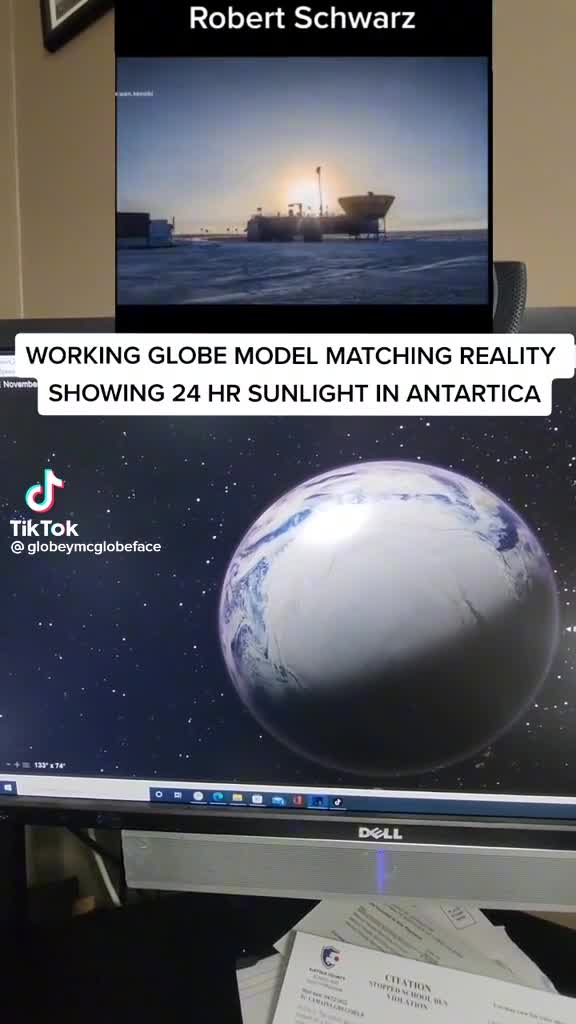05 May, 10:37
Notice: Undefined index: tg1tga_access in /home/admin/www/anonup.com/themes/default/apps/timeline/post.phtml on line 396
Ryan March
@Ryan_AM
05 May, 05:11
In response Vincent Kennedy⍟ to his Publication
Lots of people relying on others data and proofs to justify their position on this topic. Data and proofs that have egos and agendas tied to them. In order to facilitate the aquisition of your own data and proofs start out with basic science and math.
Does water always find and maintain a level at rest?
Does water require a container to maintain its depth?
Do gasses require a container?
The answer is yes to all 3. So how come oceans stick to a spinning space rock when nowhere on earth can we replicate it on a small scale? What exactly is containing all the oceans waters? Also given our atmosphere is a gas how does it not get sucked out into the vaccumm of space?
Does water always find and maintain a level at rest?
Does water require a container to maintain its depth?
Do gasses require a container?
The answer is yes to all 3. So how come oceans stick to a spinning space rock when nowhere on earth can we replicate it on a small scale? What exactly is containing all the oceans waters? Also given our atmosphere is a gas how does it not get sucked out into the vaccumm of space?
Notice: Undefined index: tg1tga_access in /home/admin/www/anonup.com/themes/default/apps/timeline/post.phtml on line 396
J.J. Jameson
@jjj
08 May, 06:15
In response Ryan March to his Publication
"So how come oceans stick to a spinning space rock when nowhere on earth can we replicate it on a small scale?"
Can you reproduce a raindrop at 1000x scale? No.
Can you have an elephant that is 1/1000th its scale? No.
Some things only exist at a specific scale, and there's reasons for that.
Surface tension is enough to keep a raindrop intact, but it couldn't do the same if it was the size of a soccer ball.
Surface area grows much slower than volume does, meaning larger animals have much less skin surface per kg of weight than smaller animals do, requiring different tradeoffs in anatomy to make things work when it comes to body heat, blood circulation, breathing, etc.
Just because you can't scale up your little water experiments it doesn't mean there is any proof there for a flat earth. As scale and mass go up, gravity eventually becomes the dominating force, despite being hard to quantify at human scale.
Can you reproduce a raindrop at 1000x scale? No.
Can you have an elephant that is 1/1000th its scale? No.
Some things only exist at a specific scale, and there's reasons for that.
Surface tension is enough to keep a raindrop intact, but it couldn't do the same if it was the size of a soccer ball.
Surface area grows much slower than volume does, meaning larger animals have much less skin surface per kg of weight than smaller animals do, requiring different tradeoffs in anatomy to make things work when it comes to body heat, blood circulation, breathing, etc.
Just because you can't scale up your little water experiments it doesn't mean there is any proof there for a flat earth. As scale and mass go up, gravity eventually becomes the dominating force, despite being hard to quantify at human scale.
Notice: Undefined index: tg1tga_access in /home/admin/www/anonup.com/themes/default/apps/timeline/post.phtml on line 396
10 May, 02:30
In response J.J. Jameson to his Publication
why do clouds, stars and airplanes maintain their positions relative to earth spinning? why aren’t all rains sideways as it nears the spinning earth? how does earth maintain its atmosphere without soinning motion moving gases up and away. atmosphere, air as we know it is not affected by gravity. is gravity really a magnetic pull?
Notice: Undefined index: tg1tga_access in /home/admin/www/anonup.com/themes/default/apps/timeline/post.phtml on line 396
1. Clouds: Drag. Look up Coriolis effect.
2. Rain: One, it is too small scale and short term for the effect to be noticeable. Two, because the atmosphere moves roughly at the speed of the surface, something like a rain drop moving from one system to the other appears to be falling straight down.
3. Atmosphere: Gravity. The magnetic field also protects our atmosphere, and planets without a magnetic field have a much harder time retaining an atmosphere.
Of course air is affected by gravity. It's comprised of particles and periodic elements that have mass, same as other matter and is affected by gravity all the same.
4. Gravity: No, it is not a magnetic pull, it is a separate force.
2. Rain: One, it is too small scale and short term for the effect to be noticeable. Two, because the atmosphere moves roughly at the speed of the surface, something like a rain drop moving from one system to the other appears to be falling straight down.
3. Atmosphere: Gravity. The magnetic field also protects our atmosphere, and planets without a magnetic field have a much harder time retaining an atmosphere.
Of course air is affected by gravity. It's comprised of particles and periodic elements that have mass, same as other matter and is affected by gravity all the same.
4. Gravity: No, it is not a magnetic pull, it is a separate force.
03:48 PM - May 10, 2022
In response Forever Patriot to his Publication
Only people mentioned by jjj in this post can reply

